|
|
|
Sort Order |
|
|
|
Items / Page
|
|
|
|
|
|
|
| Srl | Item |
| 1 |
ID:
087859
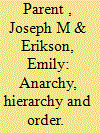

|
|
|
|
|
| Publication |
2009.
|
| Summary/Abstract |
How does order emerge from anarchy? While scholars generally agree that international politics is anarchic, there is much dispute about how anarchy orders relationships. This paper challenges prevailing views by attacking the problem of anarchy from behind. We examine how hierarchy creates order and argue that two mechanisms are responsible. The first is the direct actions of a leviathan; the second is an indirect effect, which counterintuitively results from insurmountable handicaps to central authority, that we call the threat of incompetent intervention. We then examine how these two mechanisms affect order as power decentralizes and highlight how bottom-up and top-down processes intersect. Our arguments are tested in difficult cases: highly developed states, where central authority is strongest, and international politics, where central authority is weakest. The arguments have broad implications for all the paradigms, trust in world politics and organizational change.
|
|
|
|
|
|
|
|
|
|
|
|
|
|
|
|
| 2 |
ID:
087856
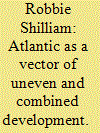

|
|
|
|
|
| Publication |
2009.
|
| Summary/Abstract |
The conversation between Alex Callinicos and Justin Rosenberg broaches an issue that is central to any sociological approach to the subject matter of international, namely, the extent to which analogies drawn from 'society'-understood as an endogenous entity-can be used to explain inter-societal phenomena. So far, the debate has focused analytically primarily upon the relationship between class conflict and geopolitics, and has exhibited a substantive focus primarily upon European history. The contribution of this article to the debate is to problematize both these foci. I suggest that Atlantic slavery and the racialization of New World identity might be the fundamental vector through which to explore the special quality of international sociality in the making of the modern world.
|
|
|
|
|
|
|
|
|
|
|
|
|
|
|
|
| 3 |
ID:
087858


|
|
|
| 4 |
ID:
087854


|
|
|
|
|
| Publication |
2009.
|
| Summary/Abstract |
What is the status of Trotsky's notion of uneven and combined development within Marxist theory and how might it be fruitfully employed by Marxists in international relations? Is uneven and combined development a transhistoric general abstraction or does it need rooting in the relations, processes, tendencies and counter-tendencies of a particular mode of production? This article rejects Justin Rosenberg's recently drawn conclusion that uneven and combined development is usefully understood as a transhistoric general abstraction that potentially offers the basis of a transhistoric theory of the international. Instead it questions the value of transhistoric categories for Marxist theory and pursues the argument that uneven and combined development is best understood within the relations, processes and tendencies of the capitalist mode of production, arguing that capitalist social relations and political forms are historically unique in their capacity to generate both combination and unevenness.
|
|
|
|
|
|
|
|
|
|
|
|
|
|
|
|
| 5 |
ID:
087861


|
|
|
|
|
| Publication |
2009.
|
| Summary/Abstract |
The European Union (EU) constitutes an evolving diplomatic milieu characterized by high levels of interconnectedness among the politico-administrative apparatuses of member states. The article assesses whether the continued presence of member state bilateral embassies in the EU is residual and largely emptied of function, or whether they are adapting their role to new requirements in the EU policy environment. An analytical framework is developed conceptualizing diplomatic representation around three variables-function, access and presence-and two scenarios of change dynamics in the structures of bilateral diplomacy in the EU are proposed. These are then utilized to evaluate empirical evidence gathered in embassies of six member states in London and Vienna. The findings reveal a process of gradual 're-gearing' of embassy functions towards EU matters, shifting patterns of communication and access, and 'domestication' of diplomatic presence in terms of personnel and agenda. Overall, this amounts to a shift towards EU-oriented bilateralism.
|
|
|
|
|
|
|
|
|
|
|
|
|
|
|
|
| 6 |
ID:
087857
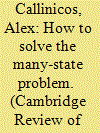

|
|
|
|
|
| Publication |
2009.
|
| Summary/Abstract |
This article responds to the debate provoked by the author's 'Does capitalism need the state system?' (Cambridge Review of International Affairs, 20:4 2007, 533-549) and his exchanges with Justin Rosenberg (Cambridge Review of International Affairs, 21:1 2008, 77-112). It is divided into three parts. The first restates the issues, situating them in the context of a growing Marxist preoccupation with the international in recent years, and contrasts the 'high road'-Rosenberg's attempt to use Trotsky's concept of uneven and combined development to provide a transhistorical perspective on intersocietal relations-with Callinicos's own preferred 'low road' of more focused analysis centred on the prevailing mode(s) of production. The second addresses the fundamental criticisms addressed to him by Hannes Lacher, Benno Teschke and John M Hobson, all of whom deny that there is a necessary relation between capitalism and the interstate system. The third considers the more specific comments offered by Neil Davidson, Gonso Pozo-Martin, and Jamie Allinson and Alex Anievas, before concluding with an appeal for a move off the terrain of abstract theory to more empirical studies that can test the relative value of rival conceptual constructions.
|
|
|
|
|
|
|
|
|
|
|
|
|
|
|
|
| 7 |
ID:
087860
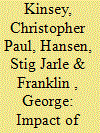

|
|
|
|
|
| Publication |
2009.
|
| Summary/Abstract |
The article discusses the use of private security contractors to support coastguard forces in the Somali substate entities of Puntland and Somaliland. Neither of these entities is sufficiently robust to raise and maintain an effective maritime security force without external assistance, hence they have had recourse to the private sector for training, logistical and operational support and high-level consultancy with respect to their coastguards. The article makes some general observations about the international private security industry and Somali politics in order to provide a context for the three case studies. The case studies, each of which covers the engagement of one security contractor in support of a coastguard, assess the roles played by the contractors, making particular reference to sustainability and influence on governance networks. The analysis establishes a matrix of security company typologies and potential roles and then uses this matrix to suggest which types of company might be best employed for which functions. The article has current pertinence, as two of the three case studies concern efforts by substate entities to hire private security to enhance anti-piracy capability.
|
|
|
|
|
|
|
|
|
|
|
|
|
|
|
|
| 8 |
ID:
087853


|
|
|
|
|
| Publication |
2009.
|
| Summary/Abstract |
Alex Callinicos and Justin Rosenberg have both drawn on the concept of uneven and combined development to resolve what they see as deficiencies in international relations theory: in the case of the former, the absence of a non-realist explanation for the persistence of the states system; in the case of the latter, the absence of a sociological dimension to geopolitics. However, Callinicos omits any consideration of the 'combined' aspect of uneven and combined development, while Rosenberg ascribes characteristics of transhistoricity and internationality to uneven and combined development which it does not possess. Against attempts to either restrict or over-extend use of the concept, I will argue that its theoretical usefulness depends on understanding the limits of its spatial and chronological reach. An alternative, if still partial, explanation for the continued existence of the states system will emphasize the continuing indispensability of nationalism as a means of both containing class conflict within capitalist states and mobilizing support for 'national capitals' engaged in geoeconomic and geopolitical competition.
|
|
|
|
|
|
|
|
|
|
|
|
|
|
|
|
| 9 |
ID:
087855
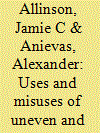

|
|
|
|
|
| Publication |
2009.
|
| Summary/Abstract |
A central concern of much contemporary Marxist scholarship in international relations (IR) is to internally relate global capitalism and the state system without reducing one of these systems to an epiphenomenon of the other. A recent attempt at this is Justin Rosenberg's reformulation of Leon Trotsky's idea of uneven and combined development (U&CD). This article examines the internal relations of 'unevenness' and 'combination' as presented by Trotsky and reworked by Rosenberg. From this anatomization of the concept, we focus on the problematic status of U&CD as a transhistorical general abstraction arising from the exchange between Callinicos and Rosenberg (Cambridge Review of International Affairs, 22:1 2008, 77-112) and suggest our own possible solution. We argue that while the uneven and combined nature of historical development represents a truly transhistorical phenomenon, its distinct causal determinations, articulated and expressed through inter-societal competition, are only fully activated under the specific socio-historical conditions of generalized commodity production. These theoretical points are illuminated through three specific historical examples (the Meiji Restoration, the 'Eastern Question' and the origins of the two World Wars). Finally, we illustrate some of the dangers of analytical overextension found in Rosenberg's own ambiguous use of U&CD.
|
|
|
|
|
|
|
|
|
|
|
|
|
|
|
|
|
|
|
|
|